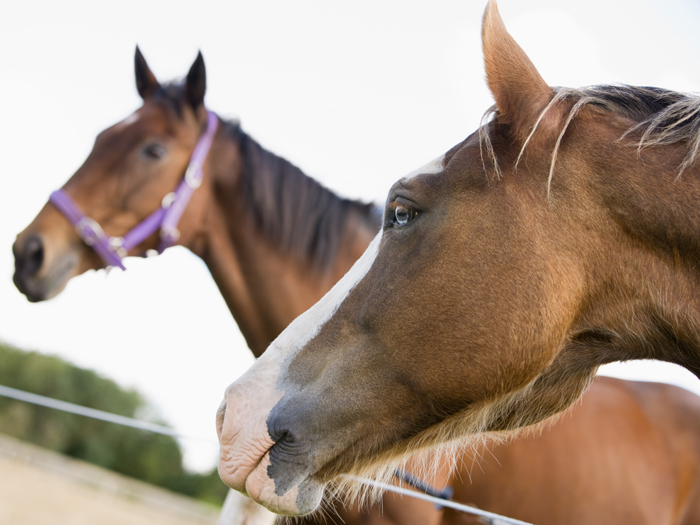Storm Losses
Moore Tornado Takes Heavy Toll on Racehorses

As a tornado headed for the heart of Moore, Okla., gearing up to level Briarwood Elementary School with an EF-5 punch, it first blazed a path through the 160-acre Orr Family Farm. Two hundred-plus mph winds laid waste to stalls, barns, fences and anything else above ground — including horses. Scores of them.
Among the many losses suffered in the May 20 twister, losses of the four-legged variety were keenly felt by many — horse owners not least among them. The tally of horses lost in the deadly tornado is approximately 200, according to the state veterinarian. One local animal disposal firm alone received at least 180 requests from area farms for the removal of deceased horses.
The Oklahoma City region’s vibrant horse industry took a heavy blow. For some, rebuilding will be a challenge.
Celestial Acres Training Court, located on the Orr property, was virtually wiped out. Once the largest horse training facility in the state, it was reduced to dust and rubble, save for a single barn. Several trainers operating out of the facility had their entire stables wiped out.
At least 80 thoroughbreds and quarter horses perished at the site, but an exact tally has been elusive because the training center maintained several hundred stalls that it rented out to boarders on a “come and go as you please” basis.
Many individual horse owners who boarded their animals at Celestial Acres and other nearby facilities will be unable to recoup their losses. Training, boarding and breeding operations typically carry Care, Custody and Control endorsements on their liability policies to cover damage to non-owned horses in their care. But that coverage doesn’t extend to acts of nature.
Local farms that lost owned horses may get relief from their farm or business property coverage. Working horses may be covered under a property policy along with other livestock. But horses kept for showing, racing or breeding would be excluded.
The bottom line is that for most individuals and business owners who lost horses in the tornado, the only available relief is mortality coverage, one of the cornerstones of the typical equine insurance suite. Mortality policies are essentially life insurance for horses, and replace the full insured value of a horse lost under nearly any circumstances.
Exact figures on the insured equine losses aren’t available. Kirby Smith, public information manager for the Oklahoma Department of Agriculture, Food and Forestry, said the department has estimated that at least half of the lost horses were insured. But opinions vary on how accurate that figure might be.
The insured losses are still substantial, running well above a $1 million and possibly even reaching $2 million if even a handful of high-value animals were among the deceased.
“Anyone who has invested $10,000 or more on a horse generally goes ahead and gets a mortality policy,” said Judi Petersen, mortality program manager for the Equestrian Insurance Group based in Phoenix, Ariz.
Even if only half of the lost horses were insured, said Petersen, chances are the insured losses are still substantial, running well above a $1 million and possibly even reaching $2 million if even a handful of high-value animals were among the deceased.
But Jeff Tebow, managing partner with insurance broker Andreini & Company in Oklahoma City, said the department’s estimate is on the optimistic side.
“In some ways I’d like that to be true,” he said, “so these people are compensated for their losses. But I’d just find that hard to believe.”
While a large percentage of the lost animals were involved in racing — particularly those that perished at the training facility — that doesn’t necessarily mean they were covered under mortality policies, said Tebow, whose brokerage insures horses across the globe through Markel’s quarter horse racing insurance program.
While the equine losses were massive for a single storm, they were actually small for the area’s horse industry overall, compared to the actual number of horses in the region and the state. Horse-related business in the area probably won’t feel much more than a ripple. Even so, it’s no less tragic for anyone in the community.
“It’s an unfortunate number of animals,” said Tebow. “One is too much. Two hundred is a catastrophic number. I’ve seen this kind of devastation from a tornado before, but I’ve never seen this type of horse loss from a storm.”










